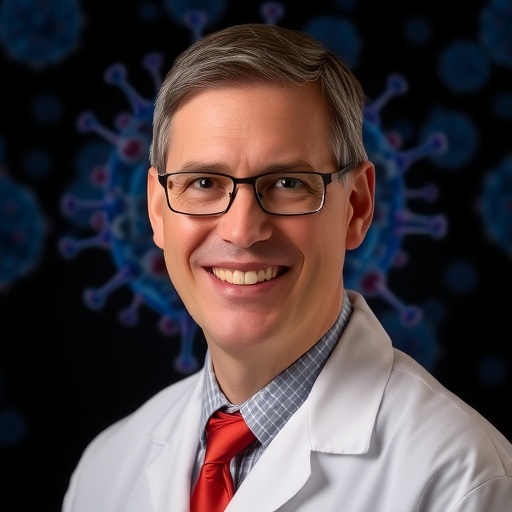In the relentless quest to combat acute myeloid leukemia (AML), a devastating blood cancer affecting roughly 20,000 Americans annually, researchers are pioneering nuanced approaches that transcend traditional treatment paradigms. Despite aggressive therapies, the grim reality remains that less than one-third of AML patients survive long term, a stark testament to the disease’s resistance and complexity. Virginia Tech’s physician-scientist Christopher Hourigan is at the forefront of a transformative movement that leverages cutting-edge molecular diagnostics to illuminate the elusive landscape of residual disease, promising to reshape prognostication and personalized therapy in AML.
The crux of this endeavor lies in the precise detection of minimal residual disease (MRD)—a term describing the minute population of malignant cells that persist following treatment and harbor the potential to ignite relapse. Conventional clinical assessments often fall short in sensitivity and specificity, leaving a diagnostic blind spot that clouds clinical decision-making. Hourigan’s work employs ultra-sensitive genomic sequencing to distinguish a single mutated gene copy amidst a sea of thousands of normal counterparts, an accomplishment that demands both technical finesse and rigorous analytical interpretation.
The implications of such granular detection are profound. By monitoring subtle molecular changes with unprecedented fidelity, clinicians can now stratify patients based on not just morphological remission but molecular remission, enabling tailored intensification or de-escalation of therapy. Hourigan articulates this approach not as esoteric precision medicine, but as a pragmatic application of all available tools to serve the patient at hand, elevating standards of care universally. The goal is to transcend one-size-fits-all regimens and instill dynamic treatment algorithms responsive to the tumor’s evolving genomic signature.
Central to this initiative is the MEASURE clinical protocol, a consortium uniting eighteen premier cancer centers nationwide alongside the Center for International Blood and Marrow Transplant Research. This ambitious collaboration, supported by the Office of Naval Research, has aggregated over a million data points from hundreds of AML patients, constructing a comprehensive repository that integrates genome-wide DNA sequencing, advanced molecular diagnostics, and detailed clinical phenotypes. The dataset holds promise not only as a diagnostic compass but as a fertile foundation for evaluating novel therapeutic agents.
Understanding the complexity of residual disease detection requires grappling with biological nuances. The presence of a single mutated allele does not unequivocally signal actionable disease; some mutations may reflect age-related clonal hematopoiesis rather than malignant persistence. Hourigan underscores this diagnostic conundrum, emphasizing the delicate balance between sensitivity and clinical relevance. Avoiding false positives that might precipitate unnecessary treatment and emotional distress is as critical as capturing true residual disease.
Beyond detection, this research embodies a paradigm shift towards integrating high-dimensional data analytics and biostatistics with clinical insight. The interdisciplinary collaboration spans diagnostic industry partners and regulatory bodies such as the FDA to standardize MRD testing, ensuring that advances are translated swiftly into clinical practice. By forging these alliances, Hourigan’s team aims to embed molecular residual disease assessment into routine care pathways, accelerating therapy refinement and improving patient outcomes.
Technological advancements in genomic sequencing underpin this revolution. Whole genome sequencing supplies comprehensive mutation profiles, while high-sensitivity molecular diagnostics tease out low-frequency variants with remarkable precision. This approach contrasts with bulk clinical assessments, revealing heterogeneity within residual leukemic populations that underlie treatment resistance. The ability to detect this molecular heterogeneity provides a powerful lens to anticipate relapse and optimize post-remission strategies.
Christopher Hourigan’s leadership extends beyond scientific inquiry; he is a visionary organizer who has expanded Virginia Tech’s Fralin Biomedical Research Institute Cancer Center in Washington, D.C., recruiting interdisciplinary teams poised to tackle cancer’s complexity. His training at esteemed institutions including Oxford, Johns Hopkins, and Harvard Business School imparts a unique synthesis of clinical acumen, scientific rigor, and strategic innovation, fueling collaborations that harness artificial intelligence and computational modeling to enhance analytic speed and accuracy.
The transformative potential of these insights is amplified by their commitment to open science and data sharing. By constructing a global resource accessible to clinicians and researchers alike, Hourigan’s consortium fosters a shared knowledge base that can catalyze breakthroughs across institutions and borders. This democratization of data not only democratizes care but accelerates discovery pipelines for emerging therapies in this rare and lethal malignancy.
Clinical outcomes are pivotal indicators of success. Hourigan’s studies have demonstrated that MRD-guided treatment modifications lead to improved survival rates, outpacing traditional clinical criteria. By advancing diagnostics beyond flow cytometry and morphological assessments to molecular detection, the research invites a refined understanding of when and how to intervene post-remission, customizing patient care plans with precision that was previously unattainable.
The significance of this work reverberates through the broader oncology community, providing a template for tackling other cancers characterized by residual disease and relapse risk. As new therapies, including targeted agents and immunotherapies, emerge, the ability to monitor their molecular impact in real time could transform clinical trials and therapeutic algorithms alike. Hourigan’s integrative approach exemplifies the future of oncology, where personalized care is informed by a deep molecular understanding of disease dynamics.
Honored as an Innovator in Health Care by the Washington Business Journal for 2025, Christopher Hourigan exemplifies the leadership and vision necessary to navigate oncology’s evolving frontier. His efforts reflect a commitment to harnessing technology and collaboration to tackle one of medicine’s most formidable challenges, bringing hope to patients and families confronted with AML’s devastating prognosis. As molecular medicine continues to advance, the strategies pioneered in AML will set a precedent, heralding an era where cancer treatment is not only reactive but anticipatory, personal, and profoundly effective.
Subject of Research: Acute myeloid leukemia (AML) and molecular detection of residual disease.
Article Title: Advancing AML Outcomes: Precision Molecular Diagnostics at the Forefront of Cancer Care
News Publication Date: Information not provided.
Web References:
- Fralin Biomedical Research Institute: https://fbri.vtc.vt.edu/
- Virginia Tech Carilion School of Medicine Department of Internal Medicine: https://medicine.vtc.vt.edu/academics/academic-departments/internal-medicine.html
Image Credits: Virginia Tech
Keywords: Cancer, Leukemia, Metastasis




